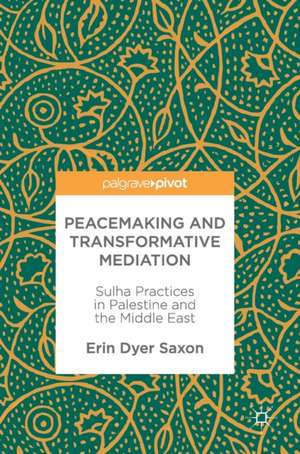Peacemaking and Transformative Mediation: Sulha Practices in Palestine and the Middle East
Autor Erin Dyer Saxonen Limba Engleză Hardback – 11 sep 2017
| Toate formatele și edițiile | Preț | Express |
|---|---|---|
| Paperback (1) | 350.27 lei 38-44 zile | |
| Springer International Publishing – 11 aug 2018 | 350.27 lei 38-44 zile | |
| Hardback (1) | 418.83 lei 43-57 zile | |
| Springer International Publishing – 11 sep 2017 | 418.83 lei 43-57 zile |
Preț: 418.83 lei
Nou
Puncte Express: 628
Preț estimativ în valută:
80.14€ • 83.89$ • 66.70£
80.14€ • 83.89$ • 66.70£
Carte tipărită la comandă
Livrare economică 31 martie-14 aprilie
Preluare comenzi: 021 569.72.76
Specificații
ISBN-13: 9783319603056
ISBN-10: 3319603051
Pagini: 157
Ilustrații: XIV, 157 p.
Dimensiuni: 148 x 210 mm
Greutate: 0.36 kg
Ediția:1st ed. 2018
Editura: Springer International Publishing
Colecția Palgrave Macmillan
Locul publicării:Cham, Switzerland
ISBN-10: 3319603051
Pagini: 157
Ilustrații: XIV, 157 p.
Dimensiuni: 148 x 210 mm
Greutate: 0.36 kg
Ediția:1st ed. 2018
Editura: Springer International Publishing
Colecția Palgrave Macmillan
Locul publicării:Cham, Switzerland
Cuprins
1. Introduction and Methodology.- 2. Theoretical Perspectives on Mediation and the Third Party Role.- 3. Culture and Conflict Resolution.- 4. A Brief History of Palestine and Conflict Resolution.- 5. Interviews with Palestinian Peacemakers.- 6. The Underlying Ideological Framework of Mediation Practice with Wi’am.- 7. Comparison of Palestinian Peacemaking with the Transformative Mediation Framework.- 8. The Promise and Limits of Transformative Mediation in Palestine.
Notă biografică
Erin Dyer Saxon, PhD, is a conflict resolution trainer, facilitator, mediator, and coach. A graduate of Trinity College Dublin, Ireland, she has also written on Palestinian nonviolence. Dr. Saxon was formerly the Director of the Center for Peace Studies and Conflict Resolution at Endicott College, USA.
Textul de pe ultima copertă
This book evaluates the potential for the transformative mediation framework to be adopted in a non-western context. Inspired by the premise that mediator ideology exists and has deep impact on process, Robert A. Baruch Bush and Joseph P. Folger articulated the transformative mediation model which itself evolved from a culture of individualism and problem-solving. This theory of conflict transformation has engaged scholars and practitioners across North America, Europe and Australia. The question remains: is the Transformative Mediation Framework relevant outside of the “West”? Through qualitative interviewing with Palestinian practitioners of the traditional conflict resolution process sulha and in-depth research analysis, this study outlines what distinguishes the ideologies and practices of transformative mediation and Palestinian sulha.
Caracteristici
Marks the first work to outline a working theory of sulha practice, from the ideological background to the practice of conflict resolution in Palestine Provides in-depth understanding of inner workings of sulha practice from a local practitioner perspective Admits shortcomings of the western model and advocates the strength of local capacities for peace Includes supplementary material: sn.pub/extras
